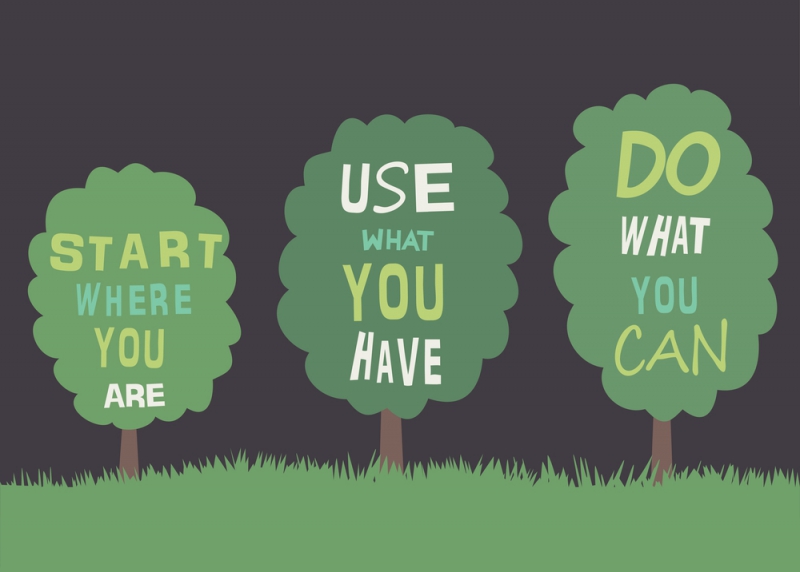Types of motivation
There are two types of motivation. The internal kind comes from within ourselves. We do things because we enjoy the process. If I enjoy taking baths, I don’t need to get paid or praised to keep on doing that. External motivation, on the other hand, is associated with either a reward or a lack of punishment. For instance, we pay taxes so as not to get fined.
Studies show that external motivation improves the quantity of our work, and internal motivation improves its quality, but it’s better to combine both. Running on a treadmill can be motivated internally (desire to be healthy) or externally (desire to be commended).
It’s dangerous to rely on just one type of motivation. Say you’ve got a job that you don’t like, but it pays well. The issue here is that your internal motivation will continue to deteriorate. It will become increasingly more difficult to understand what you truly want. In worst cases, we lose all sense of motivation and drive.

Optimum motivation and the Yerkes-Dodson law
Researchers Robert M. Yerkes and John Dillingham Dodson have once found that the best results are achieved when we are moderately motivated. After conducting experiments on mice, they carried out another experiment with human subjects who were asked to complete various tasks such as making calculations, throwing a ball, or solving a maze. The researchers gradually increased the volunteers’ rewards, from meager to larger and larger.
It turned out that, when highly motivated, the volunteers were only able to complete the simplest tasks; when somewhat motivated, they were able to solve complex tasks. What this means is that we are unlikely to succeed in something difficult, such as passing a major exam, if we are highly motivated, and our chances of success increase when we approach these tasks like routine work.
So which methods does one use in such seemingly inescapable circumstances? You can try to distance yourself from it. Think things along the lines of “this doesn’t decide my future – it’s just another simple chore.” This may sound difficult, but keep in mind: if you keep putting things off until the last moment, you might be too highly motivated.
Basic human needs
When we talk about motivation management, we talk about making ourselves want to do what we’re supposed to: finish up with work, spend time with others, make a dentist’s appointment. We’d like to do all of these things. But we only want to visit the dentist when there’s a need for that. We all have needs, and we react to them. It’s a simple chain of thought: a thought emerges – we acknowledge it – we become motivated – we look for ways to satisfy that need. Needs, or the feelings of psychological, social, or physiological deficit, are what drives us.

The American scientist Abraham Maslow categorized the various levels of needs. At the bottom are the basic physiological needs, followed by the need for safety and security, and then the feeling of belonging. At the very top are respect and recognition. Maslow said that needs must be fulfilled sequentially: we don’t focus on the higher needs until we’ve fulfilled the lower ones. Others criticized the scientist’s point of view, as history knows many cases of people who satisfied their higher needs while ignoring the lower ones. Just think of any struggling, hungry artist.
Maslow’s pyramid reflects the multitude of our physical, mental, and intellectual needs. We want to eat, spend time with others, play games, read books, visit a museum, and eat again – all at the same time. And the biggest difficulty is that we are not aware of every one of these needs. Sometimes we act a certain way without knowing why because of the needs that exist in our subconscious.
To learn how to manage your motivation, you must become aware of your hidden capabilities. Only then will you be able to choose between them and plan accordingly.

Theories of motivation
Psychology offers us several theories on motivation and personality. The Austrian scientist Viktor Frankl, for instance, who was a concentration camp survivor, adhered to the existential school of psychology. His theories claimed that an individual’s main need is the need for meaning. People seek meaning in existence, in their life and actions, and they suffer in absence of it.
In my opinion, the most well-developed and feasible theory that can be applied to self-development and self-motivation is the theory of self-determination. According to its authors Edward L. Deci and Richard Ryan, there are three main desires: for autonomy (I control my decisions), for competency (I understand why I do things), and for relatedness (interact and care for others). If the environment in which we grow up allows us to develop and satisfy those needs, then we have the biggest chances of fulfilling our potential and finding happiness.
Children who live under strict conditions without freedom of choice will grow up with their need for autonomy unfulfilled. In that case, as adults they must develop their ability to choose at every level: choose their coffee, the color of their clothes, what to eat for dinner, and so on. Having autonomy in a work environment also allows employees to feel more involved.

The need-motive-action dependency
As I’ve mentioned, motivation is based on needs. Our biggest problem is that we try to make ourselves do things that we, or others, believe to be right without taking our own needs into account or devaluing them. When making plans, we often don’t give ourselves time to rest. If we were to pay more attention to our personal reactions, life would be much easier. Listen to your body: if it wants to lay down, then that’s what you need.
Power of consciousness
It’s time to relax and stop trying to control our time and actions. The conscious mind is a powerful, wise thing that controls our time. It has its own needs, and it sets priorities even when we don’t realize it.
There’s one thought exercise that specialists use in guidance counseling. You can do it yourself. Think of and then list the things you do when you’re slacking off or procrastinating. You might watch YouTube, read, or watch birds. Very often, that activity will be the answer to the question of “What do I really want to do in life?”

The most effective way to help yourself is to be aware of your needs and react to them in a timely manner – even if they don’t fit in your schedule. Then you just won’t need to employ such thing as self-control.
The marshmallow experiment
You may have already heard of the marshmallow experiment: in the 1960s, child subjects were put in a room, given a marshmallow, and told that if they could remain there for 15 minutes without eating it, they’d get another one. Some ate the marshmallow straight away, some after a period of contemplation. But some remained patient and left with two marshmallows. 20 years later, the researchers checked back on the now-adult subjects and analyzed their lives. According to the experiment’s results, those who demonstrated self-control were more successful in life.

In 2018, a new study cast doubt on the results of the experiment. It turns out that all 90 subjects were the children of Harvard University staff. Quite a specific selection for a scientific experiment. When it was repeated with 900 children of different genders, ages, and social status, the researchers found no connection between the children’s ability to delay satisfaction and their success in life. A bigger factor was their families’ economic status: children from poor families were more likely to grab the marshmallow right away as to them, it was a rarer treat.
What this tells us is that self-control itself isn’t the end-all, be-all. Like any other psychological process, it is a finite resource. When deciding to take part in a difficult process, we must choose which activity to spend our self-control on. Dieting or business negotiations? Dentist or sports?

Procrastination
To sum up, procrastination is the human psyche’s natural reaction to a multitude of needs. We plan goals and tasks, but we can’t want them all in equal measure. Sometimes, something that’s too difficult ends up on our list (and we end up being too highly-motivated), or sometimes we don’t take our own needs into account. Procrastination also helps us do things more effectively in a shorter period of time. We might put things off for long, and then do them in a record time.
Procrastination is hard to deal with if it causes too much discomfort. The reason will most likely lay with not being able to discern between your needs. So don’t try to eradicate procrastination from your life; instead, listen to what it tells you.





